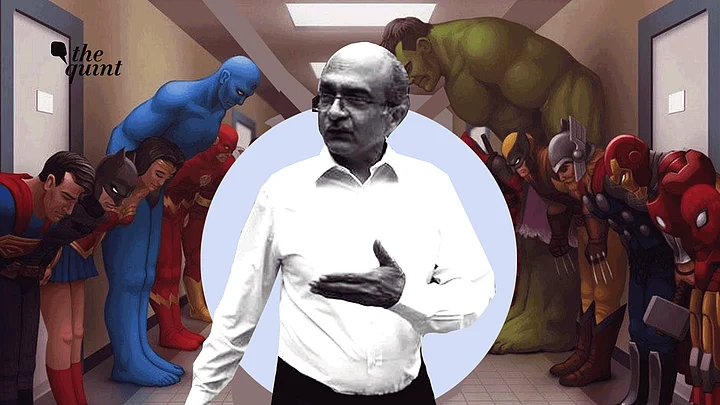The celebrated lawyer has refused to apologise after a Supreme Court bench held that a couple of his tweets constituted a contempt of court. Hungry for part-time heroes, social media declared him one; a WhatsApp image showed several fictional superheroes bowing to him as he walks past, head held high.
This case has now transformed into performative art, with its exaggerated portrayals. Bravado is perceived as bravery and privilege as persistence.
“He is not Savarkar,” goes one of the hagiographic versions. Bhushan is indeed not Savarkar, who was in prison when he wrote his mercy petition to the British government. Bhushan is not even a Justice C.S. Karnan who was awarded a six-month sentence for contempt of court because he sought an investigation into the role of judges of the Madras high court for corruption.
At the time Prashant Bhushan had gloated, “Glad SC finally nailed Karnan for gross contempt of court. He made reckless charges on judges & then passed ‘absurd’ orders against SC judges!”
Not Everyone Can Afford the Luxury of Apologising
Bhushan has been given time to reconsider and offer an apology. He has every right to refuse to do so, but his reasons appear officious.
Paraphrasing Mahatma Gandhi - and thereby drawing a parallel with himself - he said, “I do not ask for mercy. I do not appeal to magnanimity. I am here, therefore, to cheerfully submit to any penalty that can lawfully be inflicted upon me for what the Court has determined to be an offence, and what appears to me to be the highest duty of a citizen.”
There are students, journalists, professors and activists who have been picked up from their homes without a warrant or a reason for doing their duty as citizens - of questioning the government, the security forces, the judiciary. They are not granted the luxury to apologise, or not, much less to “cheerfully” accept any penalty.
Ask the people who are already in jail for crimes they have not committed what it is like. Ask those who cringe in corners not knowing when they will be picked up by the authorities or, worse, are just shot dead. They cannot imbue their protests with the moral high ground of doing their duty.
Hierarchy of Views and Apologies
Unwittingly, perhaps, Bhushan’s belief that his views are “bonafide” and were not uttered in a “fit of absent-mindedness” seem to suggest that there is a possibility of others being less legitimate, and kneejerk.
To add to the glorification, his lawyers Dushyant Dave and Rajeev Dhavan, submitted that he has a track record of fighting pro bono for social causes, including the Coalgate scam. Interestingly, when he was pulled up by the court for saying that the then Advocate General Goolam Vahavanti had lied regarding the scam, Bhushan had apologised for hurting the court’s sentiments.
Apology has its own hierarchy. When he once apologised to Baba Ramdev for posting about him being a loan defaulter, Yogendra Yadav had called him a satyagrahi (truth seeker) for his scruples to admit to a factual error.
An opinion is not a fact. And tweets on matters of the pillars of democracy, however gravelly, should not be granted gravitas. A generic criticism of the courts has little real value.
Dissent Space is Unequal
For those who believe that it isn’t the judges but the people who will decide what such a questioning of the courts means, let us just say that the surge from the bottom is a falsification. These are not the concerns of the common man, aam aadmi, the political alma mater that the good lawyer had to leave. Such online critiques only assuage those on a token conscience trip. Once the high wears off, it is back to singing the praises of the country’s democracy, not realising that protest becomes necessary only when democracy is shaky.
We do need a Prashant Bhushan to fight for the incarcerated, but we also need to understand that the dissent space is most certainly unequal.
There are victims and there are saviours, both raising their voice and refusing to cop out, but only the latter get the trophy. We justify the hype, saying that this ‘humanises’ an issue, we need a face. Does mileage bring about change? I understand that many of the issues are too entrenched, they cannot change overnight, including how the judiciary functions.
Should Prashant Bhushan decide to apologise now, could it be attributed to scruples? I imagine that those who stand with his hashtag today will, for not doing so would be a betrayal of their fealty. Either way, he is a winner.
(Farzana Versey is a Mumbai-based writer. She tweets at @farzana_versey. This is an opinion piece, and the views expressed above are the author’s own. The Quint neither endorses nor is responsible for them.)
